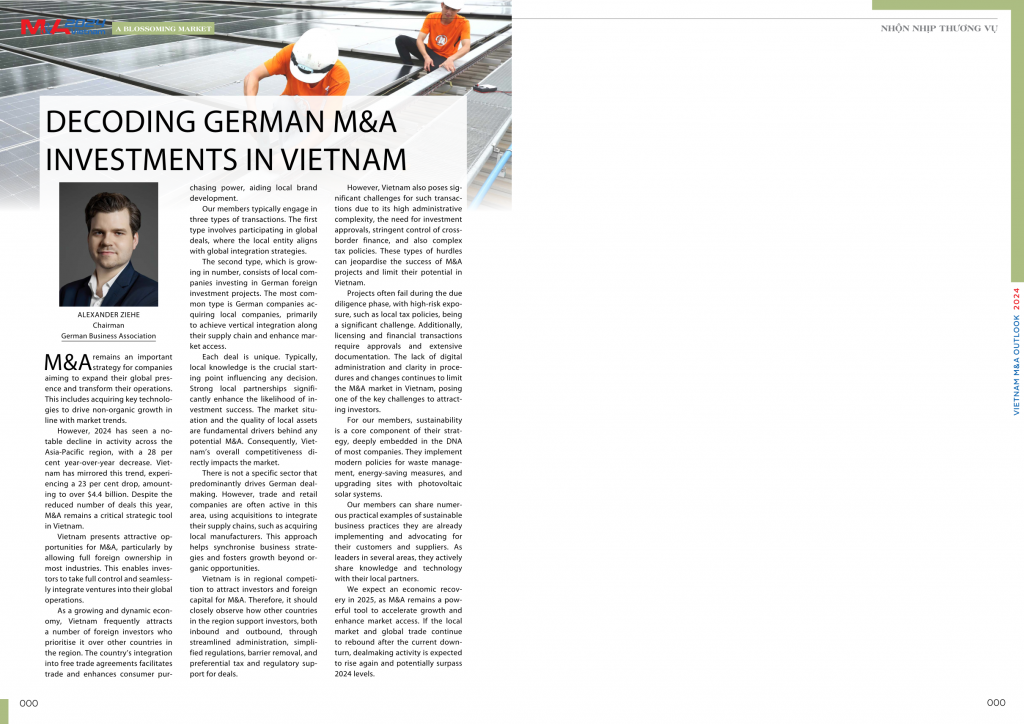
M&A remains an important strategy for companies aiming to expand their global presence and transform their operations. This includes acquiring key technologies to drive non-organic growth in line with market trends.
However, 2024 has seen a notable decline in activity across the Asia-Pacific region, with a 28 per cent year-over-year decrease. Vietnam has mirrored this trend, experiencing a 23 per cent drop, amounting to over $4.4 billion. Despite the reduced number of deals this year, M&A remains a critical strategic tool in Vietnam.
Vietnam presents attractive opportunities for M&A, particularly by allowing full foreign ownership in most industries. This enables investors to take full control and seamlessly integrate ventures into their global operations.
As a growing and dynamic economy, Vietnam frequently attracts a number of foreign investors who prioritise it over other countries in the region. The country’s integration into free trade agreements facilitates trade and enhances consumer purchasing power, aiding local brand development.
Our members typically engage in three types of transactions. The first type involves participating in global deals, where the local entity aligns with global integration strategies.
The second type, which is growing in number, consists of local companies investing in German foreign investment projects. The most common type is German companies acquiring local companies, primarily to achieve vertical integration along their supply chain and enhance market access.
Each deal is unique. Typically, local knowledge is the crucial starting point influencing any decision. Strong local partnerships significantly enhance the likelihood of investment success. The market situation and the quality of local assets are fundamental drivers behind any potential M&A. Consequently, Vietnam’s overall competitiveness directly impacts the market.
There is not a specific sector that predominantly drives German dealmaking. However, trade and retail companies are often active in this area, using acquisitions to integrate their supply chains, such as acquiring local manufacturers. This approach helps synchronise business strategies and fosters growth beyond organic opportunities.
Vietnam is in regional competition to attract investors and foreign capital for M&A. Therefore, it should closely observe how other countries in the region support investors, both inbound and outbound, through streamlined administration, simplified regulations, barrier removal, and preferential tax and regulatory support for deals.
However, Vietnam also poses significant challenges for such transactions due to its high administrative complexity, the need for investment approvals, stringent control of cross-border finance, and also complex tax policies. These types of hurdles can jeopardise the success of M&A projects and limit their potential in Vietnam.
Projects often fail during the due diligence phase, with high-risk exposure, such as local tax policies, being a significant challenge. Additionally, licensing and financial transactions require approvals and extensive documentation. The lack of digital administration and clarity in procedures and changes continues to limit the M&A market in Vietnam, posing one of the key challenges to attracting investors.
For our members, sustainability is a core component of their strategy, deeply embedded in the DNA of most companies. They implement modern policies for waste management, energy-saving measures, and upgrading sites with photovoltaic solar systems.
Our members can share numerous practical examples of sustainable business practices they are already implementing and advocating for their customers and suppliers. As leaders in several areas, they actively share knowledge and technology with their local partners.
We expect an economic recovery in 2025, as M&A remains a powerful tool to accelerate growth and enhance market access. If the local market and global trade continue to rebound after the current downturn, dealmaking activity is expected to rise again and potentially surpass 2024 levels.
Click here>>> for the Vietnamese article.
